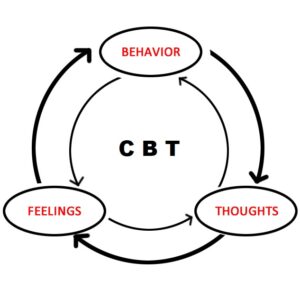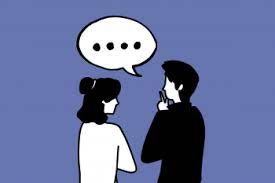Do you constantly worry about whether or not your partner really loves you? Do you repeatedly check their phone to make sure they’re not cheating on you? If so, then you may be struggling with relationship OCD. This type of OCD can be extremely debilitating and can ruin relationships. In this blog post, we will discuss what relationship OCD is, the symptoms, and how to cope with it.
Contents
What Is Relationship OCD?
 Relationship OCD is described as a subtype of OCD in which individual experiences intrusive, unwanted thoughts about their romantic partner. It is also famous as ROCD which is the acronym for Relationship OCD. This kind of OCD is not the same as feeling doubt or questioning relationship status.
Relationship OCD is described as a subtype of OCD in which individual experiences intrusive, unwanted thoughts about their romantic partner. It is also famous as ROCD which is the acronym for Relationship OCD. This kind of OCD is not the same as feeling doubt or questioning relationship status.
It is more like being afraid that you are making a mistake by being in the relationship or doubting your partner’s feelings for you. These thoughts can involve fears of infidelity, doubts about the relationship, or questioning whether or not they are truly in love.
Individuals with relationship OCD often engage in obsessive behaviors such as checking their partner’s phone for evidence of cheating, going through their partner’s things, or constantly asking for reassurance about the relationship. These behaviors can be extremely distressing and have a major impact on the quality of the relationship.
According to studies, people with relationship OCD tend to have higher levels of anxiety and depression, as well as poorer relationship satisfaction. If you think you might be struggling with relationship OCD, it’s important to seek professional help. There are treatment options available that can help you manage your symptoms and improve your quality of life.
Some Common Themes In ROCD
It is often said that those with ROCD are “stuck” on a specific behavior or thought related to their relationship. This can manifest in many different ways, but some common themes include:
- Unfaithfulness
- Abandonment
- Engulfment
- Violation of boundaries
These four themes can manifest in many different ways, but all center around a fear of loss or harm coming to the relationship. People with relationship OCD might have intrusive thoughts about their partner cheating on them, or worry that they will be abandoned by their partner.
Also, people with ROCD might be fixated on a certain behavior or thought that they believe is essential to the relationship, and if their partner does not meet this standard, it can cause immense anxiety. For example, someone with ROCD might believe that their relationship is only “perfect” if they have sex every day, and if they go even one day without this sex, they may see it as a sign that the relationship is doomed.
It’s important to remember that these thoughts and behaviors are not based in reality, and are only a reflection of the person’s anxiety. Just because someone has ROCD does not mean that their relationship is actually in danger.
There are many different ways to cope with ROCD, and it is important to find what works best for you. With time and effort, you will be better and overcome this relationship OCD.
Symptoms Of Relationship OCD (ROCD)
 The symptoms of ROCD can vary from person to person, but there are some common signs and symptoms to look out for. If you have any of the following symptoms, it might be worth considering if you have ROCD:
The symptoms of ROCD can vary from person to person, but there are some common signs and symptoms to look out for. If you have any of the following symptoms, it might be worth considering if you have ROCD:
- Constantly doubting your relationship and questioning whether or not it is “perfect”
- Seeking reassurance from your partner or others about the status of your relationship
- Avoiding situations that might trigger doubts about your relationship
- Having intrusive thoughts about your partner cheating on you or leaving you
- Spending excessive amounts of time analyzing your relationship and looking for “flaws”
- Fixating on a certain behavior or thought that you believe is essential to the relationship
- Feeling anxious or restless when you are not with your partner
- Experiencing difficulties concentrating on anything else other than your relationship
These common signs and symptoms can be debilitating and make it hard to live a normal life. If you are struggling with any of these symptoms, it is important to seek help from a professional. Otherwise, this can lead to further anxiety and distress.
What Triggers Relationships OCD?
It is often an unexpected break-up that leads to the development of ROCD. The feeling of being ‘dumped’ can be so overwhelming and emotionally painful that it can lead to the development of obsessive and intrusive thoughts about the relationship.
For example, you may start to doubt your attractiveness or question whether you are good enough for your ex-partner. These thoughts can become so persistent that they start to interfere with your everyday life. You may find yourself constantly checking your phone for messages or obsessively refreshing your social media accounts in case you see something that confirms your worst fears.
Some of the common triggers in relationship OCD include:
- Your partner not returning your calls or texts straight away
- Your partner seems ‘distant’ or preoccupied
- Not getting the level of physical or emotional intimacy that you want
- Your partner does not want to spend as much time with you as they used to
- Certain behaviors or habits that your partner has that you find irritating
These triggers are extremely distressing and can cause a great deal of anxiety. If you are struggling to cope with ROCD, it is important to seek professional help. This is because ROCD can have a significant impact on your mental health and well-being.
What Are The Consequences?
 Many consequences can come from having relationship OCD. Some of the common include:
Many consequences can come from having relationship OCD. Some of the common include:
Isolation
One of the most common consequences is social isolation. This occurs when individuals with relationship OCD become so obsessed and worried about their partners that they distance themselves from friends and family. This can lead to feelings of loneliness and depression.
Loss of Interest in activities
Another common consequence is a loss of interest in activities that were once enjoyed. This is because individuals with relationship OCD are so focused on their relationships that they have no time or energy for anything else. This can lead to a decline in work performance, school grades, and social life.
Increased anxiety
Another common consequence of relationship OCD can be increased anxiety. This is because individuals are constantly worried about their relationships and whether or not they are good enough. This can lead to panic attacks, insomnia, and other anxiety-related disorders. For example, if you are always worried about your partner cheating on you, you might have anxiety about going to work or leaving them alone.
So as you can see there are several negative consequences and that also leads to more anxiety. If you or someone you know suffers from relationship OCD, it is important to seek professional help. There are many treatment options available that can help lessen the symptoms and improve the quality of life.
How To Treat?
People usually avoid situations that may trigger their anxiety. In the case of relationship OCD, somebody might avoid getting into a relationship or staying in one because they fear the possibility of getting hurt. They may also avoid any type of physical or emotional intimacy out of fear that they will do something to screw up the relationship. So it is important to treat relationship OCD. Some of the treatment options include:
Cognitive behavioral therapy
 CBT is considered the gold standard for treating OCD. It works by helping you change your thinking patterns and behaviors. During the CBT session, a therapist is more likely to help you challenge and reframe your thoughts. It aims at helping you become more aware of your thoughts and feelings so that you can manage them better.
CBT is considered the gold standard for treating OCD. It works by helping you change your thinking patterns and behaviors. During the CBT session, a therapist is more likely to help you challenge and reframe your thoughts. It aims at helping you become more aware of your thoughts and feelings so that you can manage them better.
Exposure and response prevention therapy
This is a type of CBT that involves gradually exposing yourself to your relationship fears and learning how to cope with the anxiety they trigger. It can be an effective treatment for relationship OCD, but it’s important to work with a therapist who is experienced in treating OCD. For example, you might start by thinking about your fears for a few minutes each day, and then work up to spending an hour with them.
Cognitive restructuring
Cognitive restructuring is an important part of CBT for treating relationship OCD. This involves learning to identify and challenge the negative thoughts and beliefs that are causing you distress. For example, if you’re obsessing over the idea that your partner is cheating on you, you would learn to question that belief. Is there any concrete evidence to support this belief? If not, why are you allowing it to control your life? So this way, it can help you to reduce the hold that your obsessions have on you.
Medication
In some cases, it is necessary to seek professional help to manage relationship OCD. Often, a combination of medication and therapy is the most effective approach. Medication can be used to help manage the anxiety and depression that often accompanies OCD. Moreover, there is no such thing as “cures” for mental illnesses like OCD – but with the right treatment, people can and do recover.
Some of the commonly prescribed medications include:
- Selective serotonin reuptake inhibitors (SSRIs)
- Serotonin and norepinephrine reuptake inhibitors (SNRIs)
- Tricyclic antidepressants (TCAs)
- Monoamine oxidase inhibitors (MAOIs)
It’s important to note that medications will not “cure” OCD – but they can be an important part of treatment. Medications can help to lessen the symptoms and allow people to better participate in therapy.
So, these are some of the treatment options that can be considered for those struggling with relationship OCD. If you think you might have relationship OCD, it’s important to reach out for help. Don’t suffer in silence – there is hope and help available. Please feel free to reach out if you need someone to talk to.
Can It Be Prevented?
Relationship OCD is often triggered by a stressful event, such as infidelity or betrayal. There is no sure way to prevent it, but there are things you can do to reduce your risk.
Talk to your partner
 This is probably the most important thing you can do. If you’re feeling anxious or stressed, talk to your partner about it. Tell them what you’re feeling and why. This will help them understand your anxiety and allow them to support you. You can share this article with them to help explain what you’re going through.
This is probably the most important thing you can do. If you’re feeling anxious or stressed, talk to your partner about it. Tell them what you’re feeling and why. This will help them understand your anxiety and allow them to support you. You can share this article with them to help explain what you’re going through.
Also, you should educate your partner about OCD and how it can affect your relationship. This will help them be more understanding and supportive. Proper knowledge about the condition is a powerful tool against it. Because when you know what’s going on, it’s easier to deal with it.
Develop healthy mechanisms
It is important to develop healthy mechanisms to cope with relationship OCD. This might include things like:
- Identifying and challenging your negative thoughts
- Distracting yourself from intrusive thoughts
- Exposing yourself to your fears
- Practicing relaxation techniques
All of these things can help you to better cope with your relationship OCD and manage your symptoms. Relaxation techniques, in particular, can be very helpful in managing anxiety. Because it gives you a way to calm your body and mind, it can be very helpful in managing intrusive thoughts and anxiety.
Do not compare
This is one of the most difficult things to do when you have relationship OCD. You constantly compare your relationship to other people’s relationships and wonder why yours isn’t as good. This only leads to more anxiety and distress. So you have to be careful not to compare your relationship to others. Try to focus on the positive aspects of your relationship. This can be difficult, but it’s important to try.
Be honest about your feelings
In any relationship, it is important to be able to openly express your thoughts and feelings to your partner. It is important to feel comfortable communicating with your partner about both the good and the bad. If you are struggling to express your feelings, it may be helpful to see a therapist or counselor who can help you to communicate more effectively.
You should not assume that your partner can read your mind. Because this can lead to misunderstandings, resentment, and even conflict. If something is bothering you, it is important to tell your partner directly. This will help to avoid any misunderstandings and will allow you to work together to resolve any issues.
Take care of yourself
Taking care of yourself is one of the most important things you can do when you’re struggling with relationship OCD. Make sure to schedule time for activities that make you happy and help you relax. This can be anything from reading, going for walks, or listening to music.
It’s also important to eat healthily and exercise regularly. Taking care of your body will help you feel better and be able to cope with stress more effectively. Moreover, you can talk to your friends and family about what you’re going through. It can be helpful to hear from others who understand what you’re dealing with.
Join a support group
 Support groups are available to help people with OCD. Many online and offline groups can offer support and advice. It is also important to find a group that understands your specific type of OCD. This can help manage your symptoms and triggers. There are also online forums that can be helpful. These can provide support and information on coping with OCD.
Support groups are available to help people with OCD. Many online and offline groups can offer support and advice. It is also important to find a group that understands your specific type of OCD. This can help manage your symptoms and triggers. There are also online forums that can be helpful. These can provide support and information on coping with OCD.
In fact, studies have found that group therapy can be an effective treatment for OCD. One study found that group therapy was more effective than individual therapy in reducing symptoms of OCD. Group therapy can also help people with OCD to feel less alone and more supported.
With these prevention tips, you can hopefully avoid a full-blown outbreak of relationship OCD. But even if you do end up with the condition, know that you are not alone and there are treatments available to help you manage your symptoms. Thus, you should not hesitate to seek professional help if you think you might have relationship OCD.
Conclusion
To conclude relationship OCD is characterized by intrusive thoughts about the relationship itself. The person with this disorder is plagued by doubts and fears that their partner does not love them or will leave them. More often it is the fear of abandonment that dominates their thinking. They may try to control their partner’s behavior in an attempt to prevent this from happening.
Henceforth, if you feel like you have to doubt your relationship status or feel the need to control everything in your partner’s life, you might be a sufferer of Relationship OCD. But don’t worry, with the right kind of help and support, you can get better.
For more information and tips you can contact Therapy Mantra. We have a team of professional therapists who can provide you with the support and guidance you need to recover from this condition. Contact us today to learn more about our services. You can also book an online therapy session or download our free OCD treatment app on Android or iOS.


